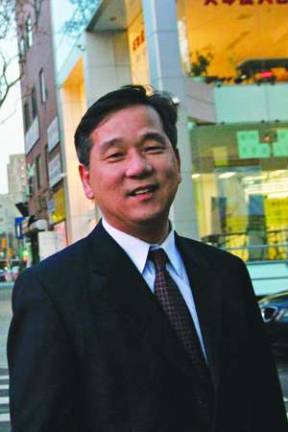Community Leader Was a Beacon in Dark Times

Chris Kui helped bring emergency funds and hope to downtown after Hurricane Sandy struck By Emily Johnson On the third day after Hurricane Sandy, the staff of Asian Americans for Equality managed to gather themselves and return to their Division Street office-but like the rest of the Lower East Side, it was dark. Without electricity, they couldn't even open the gate. For executive director Chris Kui, it was a moment of truth. People in the neighborhood badly needed the sort of emergency relief his community development nonprofit was equipped to provide. "We knew we had to pull together because we had to launch this loan fund," he said last week at the office, which was once again bustling and brightly lit. "Could we find a reporter? We couldn't even open our door. But we had one generator that we had for special events like street festivals, so we were able to use that generator to open up the gate, have a press conference, plug in a computer." Emergency loan funds became a standard first response for AAFE after last year's Hurricane Irene. Kui oversaw two separate funds: one for homeowners and one for small businesses. It was a priority, he said, because for many business owners, waiting weeks or months for assessments and federal disaster assistance could mean they never reopen. "They are tremendously affected by loss of sales. Restaurants, for example, they lost their inventory. Fish, poultry, they had to get rid of all of it," he said. "It's just tragic. Wholesale businesses and warehouses on the waterfront flooded. That $30,000 makes a big difference for desperate people." In the following days and weeks, AAFE disbursed 100 loans and organized a grassroots relief effort to deliver food and basic necessities to many of downtown Manhattan's most vulnerable people-particularly recent immigrants with nowhere to go and seniors stuck in top-floor apartments in the Knickerbocker Village housing complex, where residents remained without power long after it was restored to the rest of downtown. The organization also coordinated with city government to provide translation services for the large population of non-English speakers in Chinatown, Two Bridges and the Lower East Side. On-the-ground communication was crucial in assessing and prioritizing needs in the aftermath of the storm, and it helped many people navigate a complex system in which they might otherwise have been reluctant to place their trust. "The community was so disoriented," Kui said. "They needed timely and accurate info for how to register with FEMA. We tried to simplify the process." Assembly Speaker Sheldon Silver (D-Manhattan), who nominated both Kui and David Garza ofHenry Street Settlement for the OTTY awards, praised the men for stepping up day and night to provide what he called "life-saving help." "Those were very chaotic days and weeks after the storm," Silver said. "Communication was difficult throughout the relief effort, and Chris was like a lifeline thousands of people relied on for information." The speaker also praised Kui's "tireless" grassroots efforts to mobilize people to go door-to-door and make sure residents had blankets, food and water. Kui, who lives in Flushing, did not suffer any flood damage but was himself without power for 10 days. "Compared to other people, my personal suffering was nothing," he said. "I feel attached to helping these folks. And I give credit to our staff. They really worked 24/7. Especially during the first three weeks, people were coming in on weekends to process loans." Looking ahead, Kui said, AAFE is already transitioning to more long-term recovery efforts. "We're looking at covering overhead costs for sanitation and cleanup, because those things cost money, and once people are stabilized they can go back to their jobs," he said. "We're here together to bring the community back."